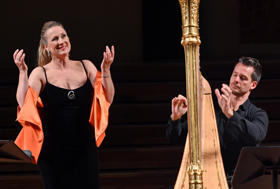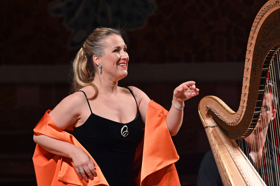Review: Diana Damrau Plays the Palace with de Maistre's Elegant Harp in Barcelona

Photo: Toni Bofill
For me, concert-going in Barcelona is not simply hearing a singer like Diana Damrau bring beauty and insights to the music of great composers, but where you get to hear her perform this magic. This week's evening of lieder and other art songs, for instance, performed with harpist Xavier de Maistre, was held in a palace--at the Palau de la Musica Catalana to be precise.
The concert hall was designed by architect Lluis Domenech i Montaner in 1908 in the Catalan equivalent of Art Nouveau, called Modernisme. It's a spectacular venue, the only concert hall declared a UNESCO World Heritage site, with its stained glass, statues and metalwork and splendid acoustics.
Of course, while the Palau is indeed a marvel, as "the play's the thing," here it was the music we were there for, and we certainly got it. Somewhere along the way, soprano Damrau--a reigning star in the opera house--decided that the harp was her soulmate on the concert stage, at least the one played by the elegant Frenchman Xavier de Maistre. And she was right: Her outing on Wednesday at the Palau was an evening that even those who don't find this kind of music their copa of cava could be swept away by.

Photo: Toni Bofill
She's been doing this program with de Maistre--or variations on it--for a number of years, and the repertoire was mother's milk (more properly cream) to her voice. She sounded wonderful and seemed to be having a grand time collaborating with him-and communicated her feelings to the audience in fine form, not only with her voice but with her eyes.
For me, the highlights of the printed program were at the beginning of the concert, with Damrau in German and Russian, before she switched to salon songs by Hahn and Poulenc, which were charming but were ultimately less interesting, a matter of musical style rather than performance.
First, there was the set of songs by Felix Mendelssohn-Bartholdy, which gave her a chance to warm up the emotions that grew stronger and surer as the evening wore on. Not that she needed to warm up. She sounded wonderful from the very first notes of "Auf flugeln des Gesanges"("On wings of song") from Six Songs, op. 34, the lilt in her voice so appealing, or the urgency in "Suleika," from the same op. 34. I particularly liked the give and take between her and de Maistre in "Der Mond," from Six Songs op. 86, her floating on the water flowing from his harp.
She showed her affinity for Rachmaninov that she projected in a knowing approach to a series of songs, with her and de Maistre playing off one another exquisitely, with their impeccable phrasing, floating high notes and astounding arpeggios. The last of the songs, "Somerki" ("Dusk") and "Zdes' khorosho" ("It is nice here") were the most Russian sounding, and so appealing, as she threw high notes in the middle of a low-lying phrase, recalling those "money notes" that brought her fame in the early part of her career.
De Maistre had a couple of chances to show off his own virtuosic gifts with an arrangement for harp of Liszt's "Le rossignol," showing his command of the music in brilliant form from top to bottom. The version was by Henriette Renie, whose own composition, "Les elfes," gave us a chance to watch de Maistre fingers flying in increasingly urgent style. It was fascinating to watch him build from barely a whisper, varying his technique from a delivery that articulated every note to one that was legato in its purest form.
As with many recitalists, once Damrau and de Maistre reached the end of the printed program, they seemed to let loose. They may not have been ready to "dance all night," but they certainly seemed that they could have gone on and on with their encores. My favorites were the two gorgeous Richard Strauss songs, "Nichts" and (particularly) "Wiegenlied" but Damrau and de Maistre appeared to have the most fun with the acrobatics of "Villanelle" by Eva dell'Acqua.
Reader Reviews

Videos
